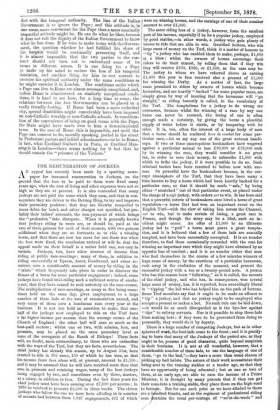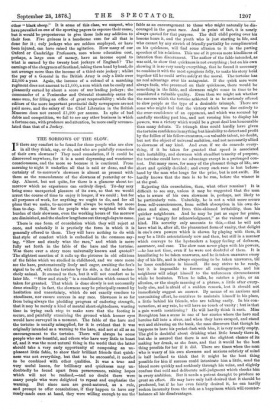THE REMUNERATION OF JOCKEYS.
AN appeal has recently been made by a sporting news- paper for increased remuneration to Jockeys, on the ground that the fees to be paid to them were fixed many years ago, when the cost of living and other expenses were not so high as they are at present. It is also contended that many jockeys are not paid the sums which they earn, and that in con- sequence they are driven to the Betting Ring, to try and improve their pecuniary position ; that they are likewise compelled to incur debts for hotel, and other charges not specified, but pro- bably their tailors' accounts, the non-payment of which brings the " profession " into disrepute. When it is generally known that jockeys riding in races are, or should be, paid at the rate of three guineas for each of their mounts, with two guineas additional when they are so fortunate as to ride a winning horse, and that there are now ten races for one there was when the fees were fixed, the conclusion arrived at will be that the appeal made on their behalf is a rather bold one, not easy to sustain. Jockeys, too, have other sources of income than riding at public race-meetings ; many of them, in addition to riding successfully at Epsom, Ascot, Goodwood, and other re- unions, earn a considerable amount of money by riding in the " trials " which frequently take place in order to discover the fitness of a horse for some particular engagement ; indeed, some jockeys have found trial-riding such a sufficient source of emolu- ment, that they have ceased to seek notoriety on the race-course. The multiplication of race-meetings, as many as five being some- times held on the same day, gives employment to a large number of these lads at the rate of remuneration named, and very many of them earn a handsome sum every year at the business. It is not too bold an assertion to make, that one- half of the jockeys now employed to ride on the Turf have a far higher income per annum than the average curate of the Church of England ; the other half will earn as much as the best-paid rectors ; whilst one or two, with salaries, fees, and presents, may be placed on the same pecuniary level as some of the occupants of the Bench of Bishops ! These facts will, no doubt, seem extraordinary, to those who are unfamiliar with the ways of the Turf, but they are facts, nevertheless. The chief jockey has already this season, up to August 31st, been trusted to ride in 392 races, 150 of which he has won, so that his income from fees alone will, at present, amount to £1,550; and it may be assumed that he will have received more than that sum in presents and retaining wages, many of the best jockeys being engaged by two, and sometimes even by three, masters, at a salary, in addition to fees. During the last three years the chief jockey must have been earning over 17,000 per annum ; in 1876 he received in presents 12,500 in three weeks. The eleven jockeys who follow the one we have been alluding to in number of mounts had between them 1,987 engagements, 402 of which were on winning horses, and the ,earnings of one of their number amount to over 11,000.
The mere riding fees of a jockey, however, form the smallest part of his income, especially if he be a popular jockey, employed by good stables,—in other words, a jockey who gets plenty of horses to ride that are able to win. Gratified .bettors, who win large sums of money on the Turf, think it a matter of honour to " tip " a jockey who has enabled them to make, perhaps, 11,000 at a blow ; whilst the owners of horses encourage their riders to do their utmost, by telling them that if they win they will receive 2100, 1300, or 11,000, as the case may be. The jockey to whom we have referred above as earning £1,000 this year in fees received also a present of /1,000 for winning the Derby. As a matter of fact, the large sums promised to riders by owners of horses which become favourites, and are heavily " backed" for some popular races, are simply given by way of insuring that the horseman will "go straight," as riding honestly is called, in the vocabulary of the Turf. The temptations for a jockey to do wrong are enormous, because whilst the winning of a race by any one horse can never be ensured, the losing of one is often enough made a certainty, by giving the horse a plentiful supply of water before it starts, or by tampering with its rider. It is, too, often the interest of a large body of men that a horse should be rendered hors de combat for some par- ticular race,—let us say any one of the great autumn handi- caps. If two or three unscrupulous bookmakers have wagered against a particular animal to lose 110,000 or 112,000 each by its winning the race, they would consider it no great tax, in order to save their money, to subscribe 11,000 with which to bribe the jockey, if it were possible to do so. Such criminal tactics have been resorted to before now with suc- cess. So powerful have the bookmakers become, in the cor- rupt atmosphere of the Turf, that they have been many a time known to buy a horse which had been heavily backed for a particular race, so that it should be made "safe," by being either " scratched " out of that particular event, or placed under the charge of a safe jockey, with orders not to win. It has been said that a powerful coterie of bookmakers once hired a horse of great reputation—a horse that had won an important event on the English Turf—with the view of taking him across the Channel, not to win, but to make certain of losing, a great race in France, and though the story may be a libel, such an in- cident might occur. An offer of 11,000 to an illiterate jockey lad to " pull " a horse must prove a great tempta- tion, and it is believed that a few of these lads are annually tempted, and have been successfully corrupted. It is no wonder therefore, to find them occasionally rewarded with the sum for winning an important race which they might have obtained by an opposite line of conduct ; and it is no wonder either that men who find themselves in the course of a few minutes winners of large sums of money, by the exertions of a particular horseman, rush away in the exultation of the moment, and present the successful jockey with a ten or a twenty-pound note. A person who has this season been "following," as it is called, the mounts of the chief jockey, and who has, in consequence, won several large sums of money, has, it is reported, been exceedingly liberal in " tipping " the lad who has helped him on the path of fortune. Some Turf moralists say that it ought to be made an offence to " tip " a jockey, and that no jockey ought to be employed who accepts a present or makes a bet. No such rule can be laid down, —it would be as much disregarded as is the bye-law against " tips " to railway servants. Nor is it possible to stop these lads from making bets ; if they were to be prevented from doing so personally, they would do it by deputy.
There is a large number of competing Jockeys, but as in other spheres of work, the best lads come to the front ; and it is gratify- ing to learn that many of the Jockeys of the period are, as they ought to be, persons of good character, quite beyond suspicion in their business. It is not at all wonderful, however, that a considerable number of these lads, to use the language of one of them, "go to the bad,"—they have a more than usual chance of pieking up bad habits. The nature of their work necessitates their being sent to the training stables at a tender age, so that they have no opportunity of being educated ; but as one or two of them, at an early age, are able to earn the income of a Prime Minister, it is thought by many parents that if they can get their sonarinto a training stable, they place them on the high-road to fortune. But for one such prize as we have alluded to there are a 14ndred blanks, and so the regiment of professional riding men lontains the usual per-centage of " neter-do-weels " and other "black sheep." It is some of this class, we suspect, who have prevailed on one of the sporting papers to espouse their cause, but it would be preposterous to give these lads any addition to their fees. Five guineas is a handsome sum for all that is done for it ; only jockeys who are seldom employed, or have been injured, can have raised the agitation. How many of our Oxford or Cambridge Professors, men whose education cost, perhaps, a large sum of money, have an income equal to what is earned by the twenty best jockeys of England ? The earnings of the clergymen of Scotland, taking them head by head, do not average more than the income of a third-rate jockey ; whilst the pay of a General in the British Army is only a little over 22,000 a year. Again, the income of a colonel of a marching regiment does not amount to 21,000, a sum which can be easily and pleasantly earned by about a score of our leading jockeys ; the commander of a Peninsular and Oriental steamship earns the same sum, for filling an office of great responsibility ; while the editors of the more important provincial daily newspapers are not paid more, and the salary of the Chief Librarian in the British Museum does not exceed 21,200 per annum. In spite of bad debts and competition, we fail to see any other business in which a fortune can, with prudence and attention, be more easily accumu- lated than that of a Jockey.































 Previous page
Previous page